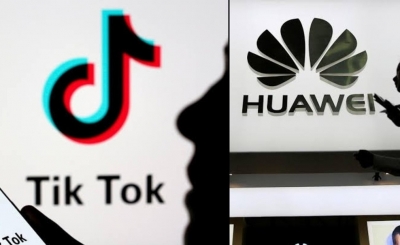New Delhi: With China-based tech giants like Huawei triggering national security concerns — amid Beijing-backed bad actors capable of orchestrating massive cyber-attacks on industries and defence establishments across the world — the outcome of the constant tussle could shape the world’s tech landscape for years to come.
Beijing has always denied its links to any large-scale cyber attack, espionage via its tech companies or stealing users’ data via its apps (like TikTok), experts warn that tensions between Washington and Beijing over technology could lead to a “digital iron curtain”, which would compel foreign governments to decide between doing business with the US or China.
According to New York-based think-tank Council on Foreign Relations, Huawei faces accusations that Beijing could use its 5G infrastructure for espionage.
“The US and other countries claim that Huawei threatens their national security. They say it is beholden to the Chinese government, which could use the company to spy,” according to the council’s latest report that came out earlier this week.
The US, Australia, Japan, and others have effectively banned Huawei from building their 5G networks, but it remains popular in low-income countries.
In recent years, the US and several other countries have asserted that Huawei threatens their national security, saying it has violated international sanctions and stolen intellectual property, and that it could commit cyber espionage.
Many US policymakers view Huawei as a commercial extension of the Chinese Communist Party (CCP).
“There are also concerns that Huawei’s 5G infrastructure could contain backdoors that allow the Chinese government to collect and centralize massive quantities of data and give Beijing the necessary access to attack communications networks and public utilities. In 2022, an FBI investigation found that Huawei equipment can be used to disrupt US military communications, including those about the U.S. nuclear arsenal,” according to the Council’s report.
Huawei, however, has denied all such accusations. The company has distanced itself from the CCP, repeatedly asserting that its equipment have never been used, and will never be used, to spy.
The US government limitations on Huawei have been ongoing since 2017, when the Congress restricted some Department of Defense networks from using Huawei or ZTE equipment.
In November 2022, the Joe Biden government banned the sale and import of new communications equipment from five Chinese companies, including Huawei and ZTE, amid concerns over national security.
Other Chinese companies listed included Hikvision, Dahua and Hytera, which make video surveillance equipment and two-way radio systems.
Hikvision, Huawei and others denied supplying data to the Chinese government. Hikvision said that its products present no security threat to the US.
In January 2023, the Biden administration stopped providing licenses for US companies to export goods to Huawei.
The countries of the so-called Five Eyes intelligence alliance — The US, Australia, Canada, New Zealand, and the UK — have banned or are rolling out bans on Huawei.
Belgium, Denmark, Estonia, France, Lithuania, Poland, Romania, and Sweden have also restricted the use of Huawei equipment in the construction of their 5G networks.
Meanwhile, China has also been accused of cyber warfare against countries.
In 2021, the US, NATO and other allies alleged China employed “contract hackers” to exploit a breach in Microsoft email systems, giving state security agents access to emails, corporate data and other sensitive information.
China-sponsored hacker groups also allegedly compromised the US energy department, utility companies, telecommunications firms and universities.
ByteDance-owned TikTok has also been in the news for reportedly stealing US users’ data.
The US plans to ban Chinese short video-making app TikTok nationwide, and the House Foreign Affairs Committee will hold a vote next month on a bill to completely block the platform.
According to reports, the bill will give the White House the legal power to ban TikTok over larger national security concerns.
Last month, the Chinese short-form video making app was banned on mobile devices issued by the US House of Representatives. The House ordered staff to delete TikTok from all mobile phones.
A TikTok spokesperson told South China Morning Post that a total ban of the app is a “piecemeal approach to national security and a piecemeal approach to broad industry issues like data security, privacy and online harms”.
“We hope that lawmakers will focus their energies on efforts to address those issues holistically, rather than pretending that banning a single service would solve any of the problems they’re concerned about or make Americans any safer,” the spokesperson said in a statement.
TikTok is currently negotiating a deal with the US Justice Department to resolve national security concerns.
IANS
